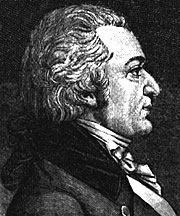Benjamin Smith Barton
 |
| Dr. Benjamin Barton taught Meriwether Lewis much about preserving the flora and fauna specimens Lewis would gather. Image © 2002 www.clipart.com. |
Of the Philadelphia "wise men" whom Meriwether Lewis visited in 1803, perhaps none was more excited about Lewis' journey than Dr. Benjamin Smith Barton. In fact, Barton wanted to join the expedition.
Having Barton along would have been quite an asset. That year he had published Elements of Botany, the first textbook on botany in the United States. Quite simply, he was America's leading expert in the field. Lewis was excited at the thought of Barton's joining. In the end Barton, 37 at the time, thought wiser of trying to make the journey despite his wonder at what Lewis might find.
Barton deserves great credit, though, for his contributions to the expedition. His role was to help Lewis' botanical knowledge and collection skills. He succeeded wildly on both accounts.
In Lewis, Barton had a student somewhat familiar with the properties of wild plants thanks to the knowledge Lewis had gained from his herbalist mother. Barton filled in the gaps. He taught Lewis how to preserve specimens, either plant, bird, or animal. He stressed the importance of labeling, including place and date of collection. He also taught Lewis the Linnaean system for classifying specimens with Latin names.
Lewis returned from the expedition with 226 plants, painstakingly collected, dried, stored, and transported during the expedition. They are preserved today as the Lewis and Clark Herbarium at the Academy of Natural Sciences in Philadelphia.
Though Barton gained fame primarily as a botanist, he was active in many fields. He practiced medicine in Philadelphia and was an active member of the American Philosophical Society. He wrote extensively about natural history, botany, paleontology, etymology, and medicine. In 1805 he founded and edited the Philadelphia Medical and Physical Journal.
Barton died in 1815 after years suffering from gout and pulmonary bleeding.
next > | 


